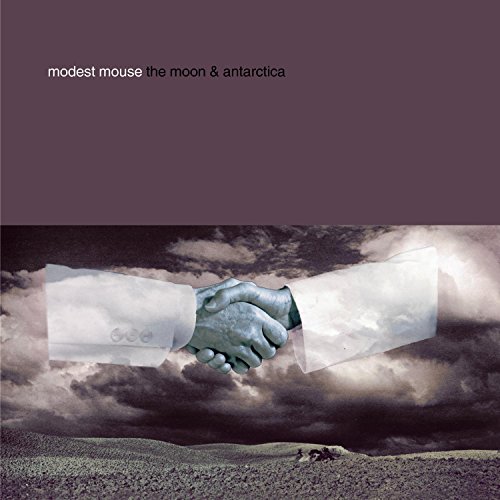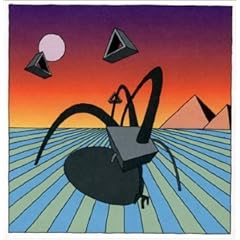After posting yesterday afternoon, I went home and re-listened to two of the albums on the list so far, MXPX and Gin Blossoms. I found that Gin Blossoms appeals to me more as a nearly 23 year old than MXPX does, though I did find myself enjoying MXPX, probably based on nostalgia alone. But, on with the list.
5. Death Cab For Cutie - We Have the Facts and We're Voting Yes
Came After: Sigur Ros, random mp3 finds.
I had a funny experience with DCFC. I had seen them listed on the Homesick for Space website under links, and found an mp3 of "Lowell, MA" and assumed that the band was from MA. I went to Berklee College of Music that summer for a week-long engineering program and thought to myself as I listened to that song, "This is what MA sounds like," chiming guitars, lo-fi recording, general awesomeness. Then I found out that DCFC was from Washington, and MA bands sounded more like the Ladybug Transistor or whatever white-man reggae was being churned out by white college students. But for a while, I was convinced that MA was the land of perfect music.
The level to which I loved DCFC my senior year of HS was pretty intense. I had this habit of listening to music as I fell asleep, and that album was in constant rotation in my CD player, and as I listened to it, I would pretend that I was Ben Gibbard, playing these beautifully intricate songs to an adoring crowd. This stemmed, I'm sure, from the fact that the bands I played in never really played the music I wanted to create, and DCFC was exactly the music I wanted to make at that point in my life. I would try to play it for my bandmates, and they kinda shrugged it off, preferring we play yet another Metallica cover. The most frusterating thing about living in San Antonio, for me, was the lack of likeminded musicians my age. I have no doubt that there were others fans of DCFC in San Antonio; I just had no idea where to find them. I wasn't a big concert goer, and bands rarely toured around San Antonio, preferring to hit Austin. Whatever scene there was in San Antonio, I was simply not a part of it. So, my way of coping with not having likeminded music fans around me was to imagine them as I fell asleep at night.
After coming to college in Nashville, I finally made connections with others who, at the least, appreciated DCFC. Finding these people was a validating experience for me, a way of knowing that I wasn't alone. I think that this was probably the same for a lot of students at Belmont. We came there mostly because it was known as a "music school," and we finally made connections with kids who had the same interests as us, instead of being outliers like we probably were in HS.
DCFC were also responsible for the most disapointing concert experience of my life, although they had nothing to do with it. My first semester at Belmont, I saw they were playing at the Exit-In. I foolishly waited until the day of to snatch up tickets at Ticketmaster, but I did get them, thankfully. I also took along my then girlfriend, Madeleine, who I had forced DCFC upon, and who, in hindsight, was not meant for any rock concert, be in Built to Spill or even Michael McDonald. But this is not about me being blind to the obvious, but about how her presence completely ruined that show. To grasp the concept of how much I was waiting for this show, and how I had no idea of concert ettiquite, I wore my DCFC shirt, which, I was told later, is not cool at all. But I really didn't know that. Also, since I didn't have a car, I had to bum a ride from my friend Robin, who didn't have a ticket, but managed to sneak in to the show b/c she had a friend who knew the openers, Mates of State. DCFC came on and played a 2 hour set, which would have been probably the highlight of my life up to the point if it hadn't been so obvious how much my girlfriend did not want to be there. And, being in love, I didn't want her to be mad at me, so that in turn ruined my experience, which was not helped by the fact we had to hang around for Robin to get a ride home, and she was interested in talking with people after the show, which didn't make for a happy girlfriend. The world that I was embracing was nothing like what she expected for us, or close to where she was going. Did indie rock and a sorority girl really have anything to do with each other? maybe in some circles, but the ones we ran in were complete opposites. I should have realized then that we were not compatible, but instead I let it drag on until she broke up with me, at my total surprise due to my obliviousness. She was totally right when she said we were moving in different directions, and that was never more apparent than at the DCFC concert.
So, what am I getting at here? DCFC not only allowed me to validate my existance as a music fan, but they also served as a signifier for a failing relationship that I never saw until it was too late.

6. Modest Mouse - The Moon and Antarctica
Came After: DCFC, Pitchforkmedia.com
For this record, I'm going to post an essay I wrote back in 2005 about why this album is my favorite of all time:
"I know it seems sort of a cop-out to write about music changing a world, but I don't believe I can do the subject justice unless I write about the most influential creative force on my young life. I suppose this is meant to be deep, certainly the topic question is one with many loaded directions to persue.So, being stumped, I thought about things that have changed my world view, or at least allowed me to view art in an entirely new way. The most jarring experience that I could think of is when I first heard Modest Mouse. I had been playing with a bunch of hard rock bands, and I think the particular one I was with was playing Metallica covers at the time, with a drummer who found it necessary to play his double bass pedal constantly.Anyways, I was going through a local record shop in the summer of my junior year in highschool, and I came across a record by Modest Mouse, The Moon and Antarctica, in the bargain bin. So I bought it, having not heard anything by them ever before.I put it in my car cd player and drove home. On the way home, I freaked out at the utter amazingness of this album. The first line sets the tone for the entire album: "Everything that keeps me together is falling apart, I've got this thing that I consider my only art of f---ing people over." At age 17, and trying to figure out where I fit in the grand scheme of things and constantly messing up, this hit home. The entire album is sovivid and surreal, like Dali threw paint on a cd and it came back as music. Even when the singer, Issac Brock, is just shouting out random phrases, it was described so brilliantly that it seemed to make sense."The universe is shaped exactly like the Earth, if you go straight long enough you'll end up where you were." On the album masterpiece, "The Stars Are Projectors" Brock sings "The Stars are projects, projecting our lives down to this planet Earth," which is the best song ever for driving home on dark Texas roads and wanting to sing at the top of your lungs at a God you're not sure exists or not.This album came along at a time when I found it hard to relate to a church and or Christianity in general, and it's amazing that an album full of songs so obviously written under the influence of drugs could describe a confusion about the concept of God as beautifully as this one did. Anger, fear, self-doubting, all of these are addressed in this record, and spat out in ways that seemed to make perfect sense to me.The music itself is so amazing, visceral and beautiful at the same time. I once read an article by Brock about how he wished he could just slap his name on the Pixies' Dootlittle album and call it his own, and I feel the exact same way about this album. It flows perfectly and by the time I get to the last song "what people are made of," I am so enveloped by it that I inevitably hit play again.So while looking back over this, I realize it seems like more of a review than how words and ideas changed the world. I'm not sure how this album affected anyone else or it's effect on the world, but for me it showed that it was ok to be confused about a higher power, and that maybe it's part of a life to question things and maybe get angry about it, and maybe you could write about things beyond what you experinced in the hallways of a high school. My favorite line off of the album comes from the song "Lives," and it goes:"it's hard to remember that we're alive for the first timeit's hard to remember that we're alive for the last timeit's hard to remember to live before you dieit's hard to remember that our lives are such a short timeit's hard to remember when it takes such a long time"I think that in his alcohol induced haze, Issac Brock described life much better than I ever could."
As talked about in the essay, for me, this album is about religion and it being viewed by a person who is both in awe of it and disgusts it at the same time. It became so important to me as I grew up in HS and college with it as perfectly expressing how I felt. The songs still resonate with me the same way as they did when I finally let myself be enveloped by the albums beauty. Modest Mouse is not an easy band to love. During my first orrientation at Belmont, the first day I wore a Modest Mouse shirt, and the second day, I wore a DCFC shirt. One guy I was hanging out with remarked on the 2nd day "Oh yeah, DCFC, they're so much easier to like than Modest Mouse." But for me, everything about that album makes pefect sense.

7. The Rapture - Echoes
Came after: Sparta, The Get Up Kids
A brief admission: I love Pitchfork. I find that, while I do not always agree with their reviews, they constantly offer great information at help me find bands I otherwise may not have discovered. This, of course, will get me shot in an indie snark-fest, but whatever. The reason I bring this up is because I discovered the Rapture via Echoes being the top album of 2004 according to Pitchfork. I was still living in New Braunfels, and the day after I read the list I went out and found a copy, thinking it had to be awesome if it was supposed to be the best album of 2004.
I really, really, did not get it.
"House of Jealous Lovers" was amazing, no doubt, but the slow jams? what the fuck? I really just didn't appreciate it. But, as with a lot of albums, it takes time to understand. I lived with that album for a few months before I really began to listen to it. And when I finally did, it became one of the most life-altering albums I have ever bought. The Rapture opened me up to electronic and dance music, through DFA and their associated artists. Before, dance music was kinda lame, and I connected it with pop music, useless music that may as well have been all Nelly. Now, dance music was exciting, it was new, it was daring. Screaming, four-on-the-floor, cowbells, whatever, I embraced it. For some reason, like DCFC, this music really connected with me at exactly the right time. I had just gotten out of the previously-mentioned relationship, and I was looking for something sonically to help me forget. Dance-punk, and its offshoots, became that for me. I started writing music with the most awesome of all programs, Fruity Loops, and the Rapture's influence affects me today in the work I do with DACC. I really didn't care when everyone started claiming it was ripping off Gang of Four and the like...why not use them as influences? It was great, moving, music. It unlocked a passion in me that still is in gear today, and I thank them for that.









